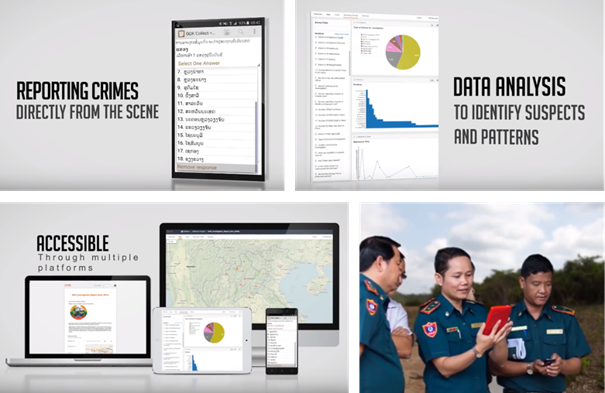Avoiding Unsustainable ICT Implementation: Ona for Forest and Wildlife Law Enforcement in Laos
We are pleased to share a guest blog post written by Aidan Flanagan, who worked as a consultant to the Department of Forest Inspection (DOFI) in Lao People’s Democratic Republic (Laos). In this post, he describes his experience creating an app with Ona to reduce illegal logging and poaching. Aidan believes it can serve as a case study for countries facing similar challenges within and beyond law enforcement.

Laos is a landlocked, but land-linked, country which is the poorest and least developed in its region. It is surrounded by large neighbours with voracious appetites for lumber and forest wildlife (China, Thailand and Vietnam), and its porous boundaries make monitoring trade difficult, especially in illegal goods. My work at the DOFI involved exploring technological ways to enforce laws against illegal logging and poaching.
Despite the challenges, the adoption of new technologies and approaches has strengthened the enforcement of forest and wildlife laws. This brief note shows how Ona and the existing smart phone infrastructure were used to develop and deliver a low cost, yet sophisticated, solution to support law enforcement.
Avoiding common pitfalls in implementing ICT solutions
In 2015, I found myself in Laos, embedded in the DOFI, with support from the World Bank and Finnish Government to strengthen forest law enforcement at a central and national level. As a forester who had experience working in Southeast Asia, I knew that to be successful, new systems and approaches needed to avoid the common mistake of having project success rely on high maintenance systems developed by third parties and imposed on local agencies with little capacity to maintain such systems when funding ceases.
The challenges in Laos are common to other developing countries: limited finances, underdeveloped infrastructure, and resource poor. The country also has active wildlife and forest crime, porous borders, voracious neighbours, and a system that is predominantly paper based. On the positive side, the country had good national internet coverage and high rates of smartphone ownership.
My team’s challenge was to create a system that was appropriate for the country, practical in supporting their adoption, and cost effective to ensure sustainability beyond the project. We decided that to develop a national intelligence capacity, we needed a system that captures and centralises information, but uses a low cost, widely available platform i.e. the smart phone.
Building a sustainable solution
The solution we created is called Smart Phone Information Reporting and Intelligence Tracking (SPIRIT). It is a national platform for the reporting and analysis of forest and wildlife crime for members of law enforcement. Personnel at the field level are able to send reports about illegal activities to Ona’s dashboard where the response team can plan real-time responses. The SPIRIT platform uses Ona to collect, host and share data, which provides several advantages that increases chances for success:
- Ona is easy to use and learn, which means technical capacity already exists. Using simple, Excel-based form coding allows law enforcement staff to gain expertise in creating their own frameworks and content — meaning implementers can do their own enhancements. Many features are already built-in such as the ability to capture information about GPS locations; photos (location, evidence and suspects); details of offenders, offences and evidence; details of species, amounts, and classification; as well as information on confiscated equipment and penalties. It is also easy to install, taking less than 5 minutes to do so. Once reported, information is automatically tagged on maps and available to upload to any GIS system. Photos can be downloaded, and statistic information cross referenced and analysed to generate intelligence that can identify trends, patterns and influence responses.
- Importantly, the solution works offline. If field teams do not have internet when filling in the report, the system will automatically send reports once an internet connection is detected.
- Support for multiple language (Lao and English in our case) gives staff complete control over the system. This results in technical terms being replaced with operational language that people actually use and understand. It also means surveys can be customized by area or by individual teams to suit their needs.
- The platform transforms information into shared, real-time actionable intelligence. Teams using SPIRIT were able to manage investigations together, developing an intelligence-led response capacity built on shared data. By providing near real time information, it created the capacity to analyse and coordinate responses to illegal activities at a local and national level. The data could also be assessed using any variable and time frame, and exported to different platforms.
- Because we’re using Ona’s public projects, SPIRIT is cheap. Ona hosts public forms and data for free so there are no ongoing costs. Also, because the surveys can be used with any smartphone — Android, IOS, Windows as well as computers — people can use their own phones which they will replace on their own.
We’re excited about the potential of the SPIRIT System. You can view an example of a reporting form at https://enketo.ona.io/x/#Y9nW. We have also used this platform to develop a ‘Criminal Dossier Database’, which is used to store information on businesses and individuals engaged in criminal activity. This form can be seen at https://enketo.ona.io/x/#YfFf. If successful, this methodology has the potential to transform law enforcement responses in Laos.

